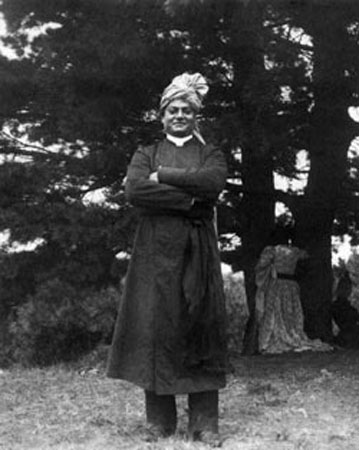Some reflections on pluralism…
There seem
to be two main versions of religious pluralism. We could perhaps call them “moderate”
and “radical”. I suppose it could be seen as ironic that there is a plurality of
pluralisms!
Moderate
pluralism, often associated in Christian circles with John Hick, is the idea
that all/most/many religions are true since they lead to the same goal. In
other words, even religions that are very different in theology and practice
(such as Christianity and Mahayana Buddhism) point towards the same god or
divine reality. With all due respect to Hick, I think many would attribute this
position to Swami Vivekananda. And precisely therein lies the problem, at least
as far as many Christians are concerned. Vivekananda believed that the ultimate
divine reality towards all religions are striving is Nirguna Brahman. But
Nirguna Brahman is a distinctly *Hindu* theological concept. Indeed,
Vivekananda might have subtly revised it, making the ultimate reality *his*
concept of the Nirguna Brahman! But how is this “pluralist”? Isn´t it really a
form of Advaita Vedanta Inclusivism? Inclusivism is the theological position that
although only one religion (your own) is true, people can get saved through
other religions as well, but only because your god chose to arrange salvation
that way. Within Christianity, this may be the official position of the
post-Vatican II Catholic Church and is also found in the writings and novels of
C S Lewis. Isn´t Vivekananda simply preaching a Reform Hindu version of the
same thing? (His book “Raja Yoga” could be given an even more narrow
interpretation, with Raja Yoga being the supreme path, and all other paths
being lower, although perhaps necessary for beginners.) As for Hick, he clearly
revised traditional Christian theology (including Christology) to harmonize
Christianity with other religions, which may not accept the Trinity or Jesus as
the Son of God, but this simply confirmed to his more conservative critics that
he was indeed adapting himself to alien creeds…
But what
about radical pluralism? That´s the idea that all/most/many religions are true
despite the fact that they have strikingly different goals. This position is also
(!) associated with Vivekananda, but is perhaps more similar to that of his
teacher, Ramakrishna. All religions are true since whatever salvific goal they
seek will be accomplished (except, of course, at the expense of any other religion).
But even this could be criticized as just another form of Inclusivism. Ramakrishna
believed that the Ultimate Divine Reality was Shakti, a cosmic energy or force
that can take many different forms. Indeed, Shakti can out of grace take exactly
the form religious devotees expect. The implication is that even entirely new
religions worshipping fictitious gods could be “true”, since Shakti simply
takes their forms! (I´m not sure if Ramakrishna explicitly drew this conclusion,
however.) In Hinduism, Shakti is personified as a goddess, and Ramakrishna did
indeed worship Her in one of Her personified forms: Kali. Thus, Ramakrishna´s
radical pluralism turns out to be the idea that *his* god-concept (or
goddess-concept) is the ultimate one, and subsumes all other. A form of Shakta
Inclusivism, in other words. No form of pluralism seems to be truly pluralist.
What´s my
take on this? For one, I don´t really care. What makes pluralism vulnerable to
the criticism that it´s really Inclusivism (and perhaps that Inclusivism is really
a form of Exclusivism since, of course, it excludes such people) is that pluralism
is usually put forward as a liberal, tolerant doctrine. For example, Hick was an
anti-racist/anti-fascist/pro-immigration activist in his native Britain. Thus, critics
can shame pluralism for not being really pluralist, or for being intolerant to Christianity
(be it Inclusivist or Exclusivist). Personally, I don´t really care about this
aspect of the equation. Pluralism could be true even if it isn´t “really”
pluralism, after all. In other words, Ramakrishna or Vivekananda (as interpreted
above) could be right! Besides, conservative forms of pluralism also exist, for
instance the version proposed by Frithjof Schuon (which I suppose is “really”
also Inclusivist – we could jokingly call it Schuonian Traditionalist Inclusivism).
Second, there
is another distinct possibility: that the correct position to take is something
we could call “agnostic pluralism”. That is, while spiritual reality looks pluralist,
it might not actually *be* pluralist. Maybe we simply lack the spiritual “sixth
sense” to see Divine Reality as it actually looks like. For all we know, it
could be very exclusivist indeed. Or even more pluralist?
With that,
I end my little reflections.

No comments:
Post a Comment